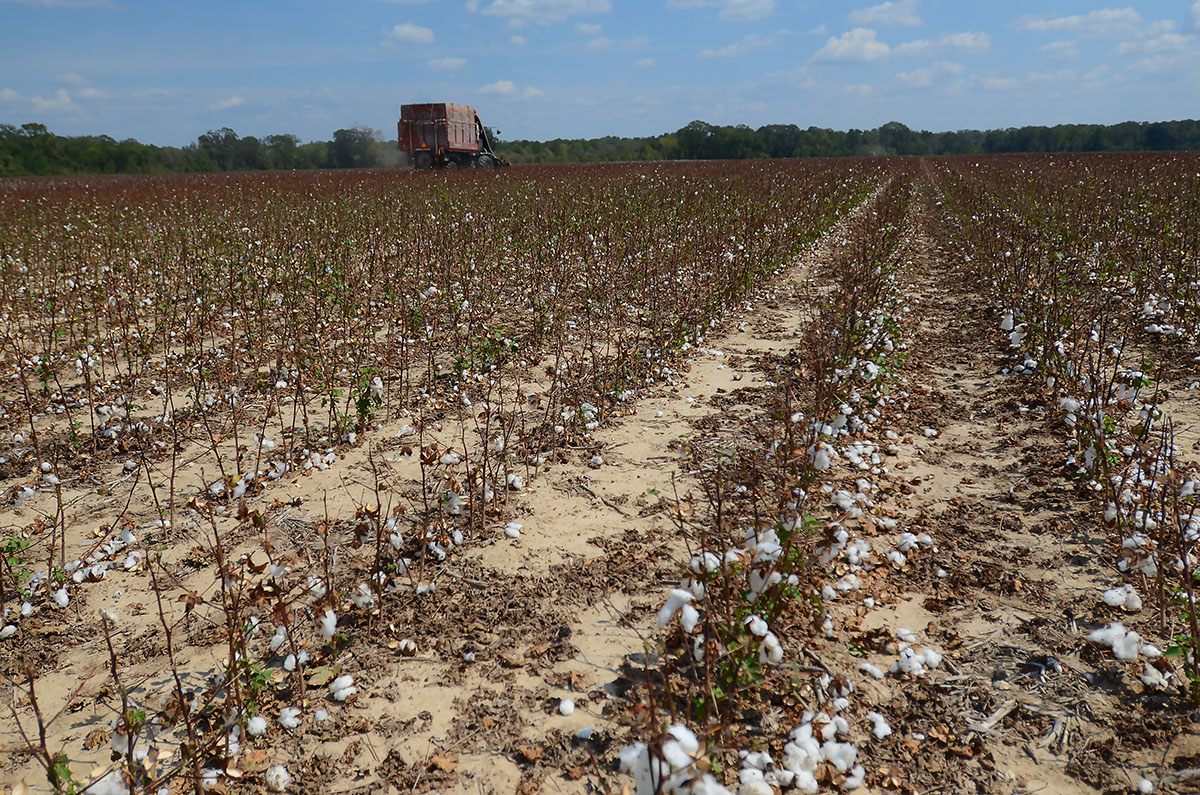No state in the contiguous United States has had more rainfall than Mississippi over the last five years. But even the wettest parts of the country are seeing their crops dry up due to unrelenting drought this summer.
A variety of plants, from cotton to soybeans to peanuts, are taking a hit in Mississippi. Livestock farmers, faced with dried up pastures, are either having to sell their cattle or feed them hay that’s supposed to be saved for the winter.
“Normally, we don’t start feeding hay to cattle until November usually,” said Shelby Bearden, Mississippi State University’s Extension agent for Copiah County. “And there were people feeding hay in August this year.”
Experienced farmers, like Louis Guedon in Jefferson County, said it’s been decades since Mississippi has seen conditions like this year.
“It ain’t been this dry in thirty-something years,” said Guedon, adding that he’s grown just a fifth of the number of corn bushels he gets under average weather conditions. “It’s a bloodbath.”
About a third of the state is experiencing “severe to exceptional” drought, according to the state’s agriculture department, and over two-thirds are seeing at least minimal drought. Over the last month, the U.S. Department of Agriculture has declared emergencies for 24 counties in Mississippi to help farmers in those areas access federal assistance.
While most of Mississippi is seeing at least “abnormally dry” weather, according to the U.S. Drought Monitor, the worst conditions are concentrated in the southern half of the state, especially in Amite, Pike, Walthall, Lawrence, Lincoln, Copiah and Simpson counties.
“It’s the worst drought we’ve seen in a long, long time,” said Mississippi Commissioner of Agriculture and Commerce Andy Gipson in a Sept. 8 news release. Gipson later told Mississippi Today that it’s too early to know where this year’s drought ranks versus previous ones, but that it’s so far comparable to one the state had in the late 1980s.

Hazlehurst farmer Walter West Jr. said the dry conditions have lasted since mid-July. At his family’s farm, he said they were able to plant corn early enough to get a good yield, but have lost about $100,000 from reduced cotton output. A third-generation farmer, West said the variance in weather conditions is just part of the job.
“That’s the risk you take,” he said, adding that some years the crops suffer from too much rain. “It’s just a big gamble I guess. Mother Nature, she’s the ultimate determination of what you do, and you’re at her mercy year in and year out.”
West said he could potentially tap into his crop insurance to stabilize the farm’s finances for next year, but hopes to not have to go that route. Gipson encouraged farmers to contact their local USDA office to report their losses and to see what types of federal aid they can access.
Guedon, whose farm has been in his family for over 150 years, emphasized that the issue is the combination of the lack of rain with the intense heat.
This summer, Jackson saw its hottest August ever, with an average temperature of 87.8 degrees Fahrenheit, according to the National Weather Service. This July was the third-hottest ever in the city.
“If you don’t think that doing nothing in 100 degree heat will exhaust you, just go put your chair out in the middle of the parking lot and just sit in it for eight hours,” Guedon said. “Your clothes will be wet with sweat, you’ll be able to wring water out of your underwear.”
He said in addition to drying out crops, the high temperatures affect his cows’ reproductive cycles.
“They’re less likely to ovulate when it’s hot, hot, hot,” he said. “And the bulls… they don’t breed the cattle as well when it’s hot, hot, hot.”

Credit: Eric Shelton/Mississippi Today
Gipson said livestock farmers are having to make tough decisions to survive financially.
“It truly is a disaster, that’s the only word for it,” the commissioner said. “A lot of the (livestock producers) are being forced into a position of having to sell out because they can’t afford to hold these cows through these conditions.”
As of Sept. 14, Mississippi farmers in 32 counties were eligible for the USDA’s Livestock Forage Disaster Program, which provides compensation to livestock producers who suffer grazing losses due to drought.
Gipson said the tough year for Mississippi farmers goes back to March, when a winter freeze took out much of the state’s blueberry production.
Despite the trying conditions, he hopes those who can will try again next year.
“I encourage every one of our farmers to get back in as soon as possible because we really need every farmer in this state,” Gipson said. “We already have fewer farmers than we’ve ever had.”

